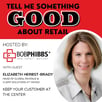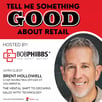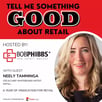Retail Podcast 707: Serge Khalimsky The Mall is Alive and Well
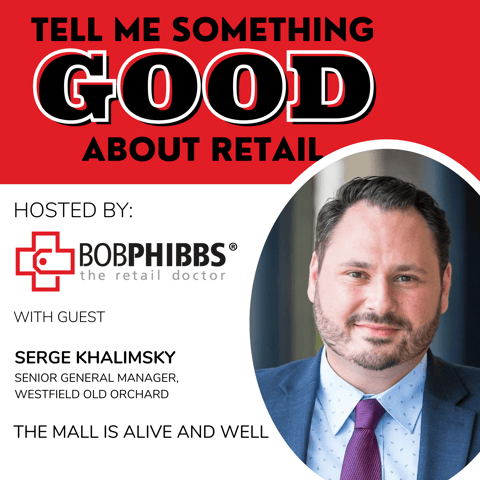
Bob Phibbs interviewed Serge Khalimsky, senior general manager of Westfield Old Orchard, about the life and times of a successful mall - and more - on this episode of Tell Me Something Good About Retail.
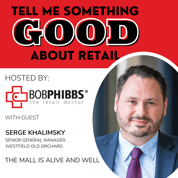
Tell me something good about retail
Serge Khalimsky The Mall is Alive and Well
Bob: Hey, thanks for joining us. Today, I’m talking with Serge Khalimsky, the senior general manager of Westfield Old Orchard in Skokie, Illinois. Welcome, Serge.
Serge: How are you doing, Bob?
Bob: I’m doing well. So, tell us, what do you do there in Skokie?
Serge: Well, in Skokie, I’m the senior general manager of Westfield Old Orchard, one of the most productive malls in the Chicagoland area.
Bob: And so how many stores are we talking about?
Serge: Talking about 140 stores and an office building with another, probably 50 to 60 office tenants. So, I like to tell people that we were mixed-use before it was cool.
Bob: That’s right. That’s right. Well, as the brick-and-mortar champion, I am the guy who said, all through the pandemic, “Yes, I get it. Good luck going to malls. Just wait till they come back.” And I’m sure you saw the traffic that I saw as things eased up. It was almost like Christmas some weekends, right?
Serge: Absolutely. I would say, before, I have colleagues on the West Coast, we have a lot of shopping centers on the West Coast. And I had colleagues that visited me here in Chicago, especially in January, February. And they’re like, “Who the hell would ever build an outdoor shopping center in the middle of Chicagoland?” And even before, Chicagoans are, you know, they’re used to it. That’s what it is. But certainly, after the pandemic, I think there are two really shining stars in the Chicago region as far as malls are concerned. And Old Orchard is one of them. Both of them are outdoor centers.
Bob: Which flies in the face of everything we hear about mixed-use potential. That’s the thing I always like about Chicago. Chicago, I always think of as kind of like New York but on a little smaller scale, a little more space between the buildings. People seem to be a little more fashionable, as a general rule. I don’t know if that holds, so maybe apparel is still something that they seek out to want to try on and experience, with all of the disclaimers of direct-to-consumer, that everybody’s realizing it’s expensive online.
Serge: Yes, absolutely. It’s been pretty interesting to watch right after the pandemic.
Bob: Well what was your first job?
Serge: My first job, I actually interned for a smaller developer in Chicago, where I think I got my love of shopping centers and retail and the power of it. And that was in the city. I was probably a teenager, and I did odd jobs in analysis. And any events that I could get my hands on for them to assign me, I would do. And I think it came full circle when some of those colleagues that I interned for after I got out of college, and a few years after, they were like, “Hey, Westfield’s looking for an assistant GM. Are you interested?” And I remember my great experiences with retailers, and relationships, and things like that. I’m like, “Absolutely.” And 10 years later, here we are. I’ve been with Westfield ever since.
Bob: Nice, nice. So, what is The Cube, which is something you guys have pioneered, and how do you use it to draw traffic?
Serge: I’d like to say Old Orchard was on the forefront of innovating for that. Because, as an outdoor center in Chicago, you go to an indoor center like Woodfield or some of these others in the region, and you can plop down any kind of brand activation or activity anywhere you want in the common area. It’s a little bit harder to do that when it’s negative 20 degrees out in the middle of the common area. So, we were tasked to figure out how to build a space that you can see from 360 degrees. So, it’s an all-glass encapsulated space right in the middle of the common area so that it can operate just like a common area activation space at any time, or you can convert it into anything.
I’m proud to have brought that to Old Orchard because we had to solve for a problem. And we were leaving opportunities on the table, but not being able to do those types of activations. And since we’ve opened, we have done major partnerships with companies like Samsung, Nespresso, who was building a brand-new store at Old Orchard and they did a cafe inside of there, and it was with all their products, and it was very cool and branded, all the way to local operators. So, we have a Ukrainian artisan shop in there right now that benefits the Ukrainians with everything that’s going on. And it’s called “It’s Oksana.” And she sources these products from Ukraine and gives back with all those sales.
Bob: Nice. Now, that certainly does seem to be the future is coming up with events. It’s not brand new for brick-and-mortar. But I think, looking at it in new ways, what would be one of your most successful, I guess, would they be considered a pop-up, or are they an activation? Or what do you think one of the most successful ones that you heard back from the brand like, “Wow, we didn’t expect that?”
Serge: We had a Barbie activation in The Cube once, and it was like an anniversary. I think it was 55 or 60 years. And it was a three-month activation. But even to this day, and this was a few years ago, this was probably 2018, we still get calls like, “When’s Barbie coming back? Why don’t you have Barbie anymore?” And it was like, I couldn’t believe how big of an impact it had because it had a diverse variety of them. There’s so many to choose from, and they’re all shapes, and colors, and sizes. It was an awesome activation.
Bob: The new movie is coming out this fall. You’re going to have to call up Mattel and say, “Hey.”
Serge: Yes, yes. I may have been a part of getting that popularity back.
Bob: I’m just saying. Gosling owes you something there for that blonde wig he has to wear. So, I know that one of the things that you talk about is how important community is to a mall. And I think The Cube is certainly part of that, but what shapes your thinking of how you actually relate in a community as an urban lifestyle center?
Serge: Not only from our partnerships with the municipality, with Skokie and all the leadership there, I think that’s a huge deal for me. And I sit on the boards of the Economic Development Commission and the board of directors for the chamber, Skokie Chapter of Kiwanis and other organizations. It’s really a place where you want a sense of community. I think from the dawn of civilization, I feel like the old-style shopping centers and bazaars and things like that, that’s where people came together. And you could see the latest trends and things like that. So, I think it still resonates to today. And even when you talk digitally native brands, they know the power of building physical relationships with their guests. Look at Apple, for example. In the beginning, they could have conducted their business 100% online if they wanted to, but they knew that the physical stores and the success of those physical stores had to do with one principle, and that’s relationships with their shoppers. And I really believe that.
Bob: I love that. I love that. Now, you’re in charge of a lot of people. So, what steps do you take to make sure that your voice, your team members, are heard? Because imagine you have all sorts of layers, but it sounds like you have to work harder, particularly to keep people engaged in these days. Would you agree?
Serge: Yes, absolutely. I like to think of myself as a champion of culture. When you go to a theme park, or when you go somewhere like Disneyland or anything like that, you notice that those people take pride of where they’re at and how they’re trained. So, everybody, from me down to every housekeeper, every janitorial staff, maintenance person, engineer, security person onsite, we all pitch in to approach a shopper at the directory and say, “Hey, can we help you find something?” Or if they just say, “I’m looking to have lunch, but I don’t know what I want.” And you can have a conversation with them by not just starting rattling off all these restaurants. You say, “What do you have a taste for? What do you feel like?” And you can say, “You can have some Mexican food at Uncle Julio’s, or some Italian at Maggiano’s or Bar Siena.” So, you really start to have that conversation. On top of that you will never catch me walk past a piece of trash on the floor, just like I expect everybody on my team to, if there’s a loose piece of paper or whatever it is. Unfortunately, there’s a lot of masks that are still floating around on the floor. Everybody pitches in to make sure that the common area and the experience is tip top. And I think that starts with culture.
Bob: Yes, and I think that the pride of working in retail is the key to all of that, right? Because if they’re proud when they show up, then people also tend to respect that. Well, my first consultant job, we took a little hotel in Newport Beach, California, and made it a nonsmoking hotel. And the key to making that work was you had to bring everybody into the table and understand, when they’re on the phone, you’re going to have to talk about this. When they check-in, you’re going to have to talk about this. And then you’re going to have to make sure that we hold to it. And if you didn’t, you heard of horror stories, but then it all made it easier, right? Was this something that you took steps to add when you became the senior general manager? Or is this something that was already there, or...?
Serge: No, I think we’ve worked on it over the past decade. And lucky for me, we haven’t had a lot of turnover in the staff because I think they all are bought in and respect the vision and the culture that we’ve built here because we all work together. Nobody’s below anybody. I will do those same tests while I’m out on the floor as anybody else, whether it’s contracted staff or employed by Westfield.
Bob: I love that. Now, let’s talk about retail trends because you’re in the depths of it, what people say, and honestly, what they’re actually doing. And so what are some of the trends that you’re seeing from a mall operator side? We’d heard that no one will ever go to a mall again, and whole wings were going to be destroyed, and Amazon was not going to buy them all and make them dark. And clearly, that’s not exactly what’s happening with you, but what are some of the trends that you see?
Serge: Well, I like to say that physical retail is a relationship. And I think you’re alluding to online and things of that nature, which is just very transactional. But it is convenient. So, I think there’s always going to be a place for convenience factor of buying things online. I do it. You do it, I’m sure. But I just can’t wrap my mind around being able to fit into the right pair of jeans, or seeing, or feeling, or actually interacting with a brand. Because one thing I’ve totally noticed is that I’m on the tail end of the millennial generation, right. And when we were growing up, Amazon and online retail was this revolutionary, revolutionary thing. Like, “Oh my God, I can buy a pair of underwear with a click of a button.” And now I feel like that’s what was driving that rhetoric. But when you’re looking at what I’ve been seeing with Gen Z, and even my own niece and nephew that are just starting high school, they actually love the mall. They love their relationships with the brands that they love. And I think there’s a real Renaissance happening right now in retail especially for the best shopping centers and the best markets in the country.
Bob: I would agree with that. I think the fallacy was that the store was the drag on the company, and now they’re realizing it’s the golden spike that the store is the brand. And if you do it right, everything grows. And if you do it wrong, you can’t fix it with online or something else. Would you agree?
Serge: Absolutely. And that goes not only to that transaction happening in a physical store, it’s also the halo effect of having that physical store on the property but it benefiting those retailers in many different ways, not only that physical location.
Bob: I think I’ve heard if they close the store, online sales goes down.
Serge: Yes, isn’t that crazy?
Bob: Like a quarter or a third, which is why so many people say, “I can’t understand why they’re not closing that store.” Because it’s more nuanced, right?
Serge: Yes. Exactly.
Bob: So, I was reading about how you all were trying to raise taxes to support a $100 million investment over the next 20 years. How’s it going? And what was the potential for job creation and tourism?
Serge: Nobody ever wants to pay extra taxes, that’s for sure, across the board. And I totally see that and agree with that myself. This was really a partnership in lockstep with the local municipality here, with the leadership in Skokie, Illinois. We thought that we can leverage some major investment into the property to really get Old Orchard to that next level, boost the economy in the local area as well as the county, add jobs, add the experience that our customers and our guests have been asking for and needing, whether it is the common area, the amenities. Having the best-in-class retail in the Chicagoland area, that’s really our goal. And I think the benefit will absolutely outweigh this short program of this tax increase.
Bob: Well, it’s that partnership, to your point earlier, the malls that get it, and are reinvigorating themselves, and figuring it out, and having The Cube or looking at how it fits into the community, like you’re so involved in all these different associations and groups, says you’re a vital part of the community versus I think the old way when, let’s face it, malls were the ones that everybody was afraid of, they were going to come and take everything from downtown. And I think people realized, “There’s downtown, but there’s also a mall and that place for it,” right, that they are different.
Serge: Absolutely. And I think with Old Orchard specifically, we’re only four miles away from the Chicago City limits. So, as these young millennial families with disposable income are moving out of the city into a little bit quieter neighborhood, we actually kind of provide that same retail and restaurant experience that you would get in the city, but it’s all in one closed ecosystem, in one closed loop. So, instead of parking for 40 bucks downtown and pushing your stroller 6 blocks, and then God knows where you are at that point, you have free parking, one closed loop. And we have done a tremendous job, and thanks to our leasing team that’s just been incredible, getting some of these Chicago, very crafty, very city popular restaurants to come to Old Orchard, with Bar Siena, which is, anybody who knows Chicago knows Bar Siena from the West Loop, had just opened here less than a month ago and they love it. And so does the community.
Bob: I love that idea, taking the best of downtown and bring in the suburbs.
Serge: Absolutely.
Bob: How nice is that? Well, what’s the best advice you ever received from a mentor?
Serge: The best advice I’ve ever received from a mentor? I think relationship is everything, whether it’s retail or, I’d say almost any business, but relationships are everything. But in this scenario, I think relationships with your shoppers is of the utmost importance. I can also give you some of the worst...
Bob: Sure. I love the worst.
Serge: So, the worst advice I’ve probably gotten, especially as it relates to Old Orchard is, “Hey, you should build a roof on Old Orchard so we can climate control it.” And then based on our conversation earlier, I mean, especially coming out of the pandemic, that was definitely, couldn’t be farther from the truth. And I don’t think we would ever do that anymore because people just feel more comfortable outside. They love the ambiance. And to be honest with you, we’re known for our landscaping because we’re outdoor and we’re about four or five miles away from Chicago Botanic Gardens. And that’s where we pull our inspiration from.
Bob: Nice. Yes. Well, let’s face it, right? If I live in Chicago, I probably don’t have a problem with winter. I might grouse about it a bit, but let’s be honest. I’m still going out there, going to hockey games, I’m going to do things. And it also, let’s be honest, at Christmas time, there’s nothing better than going through an outdoor mall that’s decked out and looks pretty, and it feels like the right place to be, right?
Serge: Absolutely. And if you really look at it, the quietest months for most retail no matter what the weather is, is usually the first quarter, right after the holiday. And that really coincides with the coldest months of the year for Chicago. So, we may have slightly more of a dip in the first quarter than some indoor malls, if you need some necessities. But people, what I’ve noticed in the last decade that I’ve been here, is that, especially Chicagoans, they’ll go out of their way to bypass an indoor mall to come and hang out here. So, we really have two busy seasons. We have spring, summer, and early fall, and then the holiday season. And I promise you, Bob, if you come here on a Saturday in the middle of June or July, it’s almost like Black Friday here.
Bob: I love that. That’s a great testament to the events and the feeling that they have when they go there. That’s amazing. So, you’ve been there for 10 years, how’s the way you thought about retail changed, do you think?
Serge: I feel very positive about it. I think, like I said, there’s a retail Renaissance happening. You know, 5, 7, 10 years ago, there was all this doom and gloom about who’s going to shop in physical retail. And I think you would be crazy to tell me that you are going to do a 100% of all of your purchases sitting behind a computer or from your phone and not going out and experiencing the world. And I think that’s what’s really changed about retail is how those retailers interact with their shoppers, how they build that relationship. And, really, they’re building more rapport than they used to. I think a lot of people are even more brand loyal than they used to be.
Bob: I would agree. I think people realize also that the associate in the store is worth more than just saying they’re disposable, and we can pay them minimum wage. They’re starting to look at it like, “Oh, that’s a key part of our branding. It’s not just about the marketing strategy or a TikTok video.” And that makes a big difference as well.
Serge: 100%.
Bob: Well, we are coming to the end of our time, my friend. And the name of this podcast is “Tell Me Something Good About Retail.” So, send us on our way with, tell me something good about retail.
Serge: Well, Bob, retail is ever evolving. It is a relationship in itself. It’s very human. And I think it provides a pulse on society at any given moment.
Bob: Wow. I couldn’t say it better. Well, thank you so much for joining us from Skokie, Illinois. And keep up the great work out there, my friend.
Serge: Thank you so much, Bob.
Key Links
Serge Khalimsky LinkedIn

Find out more about Serge
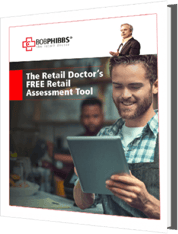
Take My FREE Retail Assessment Quiz
Use this free Retail Assessment Tool to discover where you truly excel in retail, and uncover areas for improvement.
